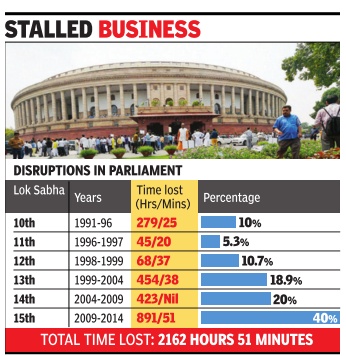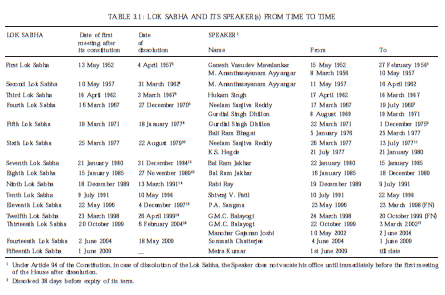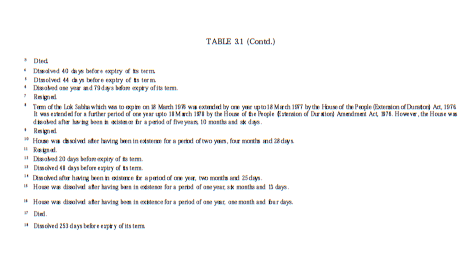The Lok Sabha
(→Percentage of women members in Lok Sabha) |
|||
| Line 62: | Line 62: | ||
'''2009'''-10.7% | '''2009'''-10.7% | ||
| + | =Speakers of the Lok Sabha= | ||
| + | [[File: The Polity1.PNG |Speakers of the Lok Sabha, 1952- 2011|frame|500px]] | ||
| + | [[File: The Polity2.PNG | Speakers of the Lok Sabha: footnotes |frame|500px]] | ||
| + | Sixteenth Lok Sabha Smt.Sumitra Mahajan 5 June 2014 - | ||
Revision as of 12:49, 3 June 2018

These are newspaper articles selected for the excellence of their content.
|
The leader of the opposition
Cong can't get LoP post in LS: AG to Speaker
Dhananjay.Mahapatra @timesgroup.com New Delhi: The Times of India Jul 26 2014
In 2014, with just 44 seats, Congres had based its claim for the post of leader of opposition post in the Lok Sabha on the law relating to Salary and Allowances of Leader of Opposition in Parliament Act, 1977 and the rules there under. The law provides the largest opposition party would get the post. Answering a query on this issue posed to him by the 2014 Speaker Sumitra Mahajan, attorney general Mukul Rohatgi referred to the rulings given by highly regarded parliamentarian G V Mavalankar, the first Speaker of the Lok Sabha. He said Mavalankar's directions were adopted to deny LoP status to any party during the period when Jawaharlal Nehru was the PM from 1947 to 1964.
According to Rohatgi, Mavalankar had ruled that to get the post in the Lok Sabha, an opposition party has to secure a minimum of 10% of the seats, that is it must have a strength of 55 MPs.
Rohatgi said Mavalankar had felt that the main opposition party's numbers must equal the quorum, which is 10% of the total strength, required for functioning of the House. Following Mavalankar's ruling, the Congres regimes under Nehru, Indira Gandhi and Rajiv Gandhi had decided not to give the LoP post to the then largest opposition party because they had failed to reach the 55 MP-mark in the Lok Sabha.
The Centre has highlighted direction 121 of `Directions to the Speaker' which provide that a party's strength must be one-tenth of the Lok Sabha to be recognized as a parliamentary party or group.
Percentage of women members in Lok Sabha
Source: PRS Legislative Research
India Today June 1, 2009
Ladies first
1952-4.4%
1957-4.5%
1962-6.7%
1967-5.8%
1971-4.9%
1977-3.8%
1980-5.7%
1985-7.9%
1989-5.2%
1991-7.6%
1996-7.4%
1998-8.1%
1999-9.2%
2004-8.7%
2009-10.7%
Speakers of the Lok Sabha
Sixteenth Lok Sabha Smt.Sumitra Mahajan 5 June 2014 -

